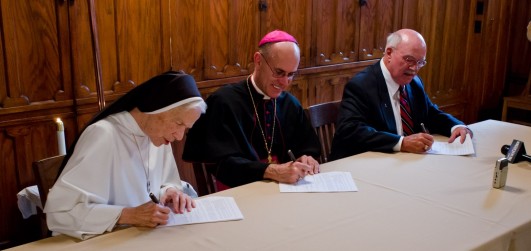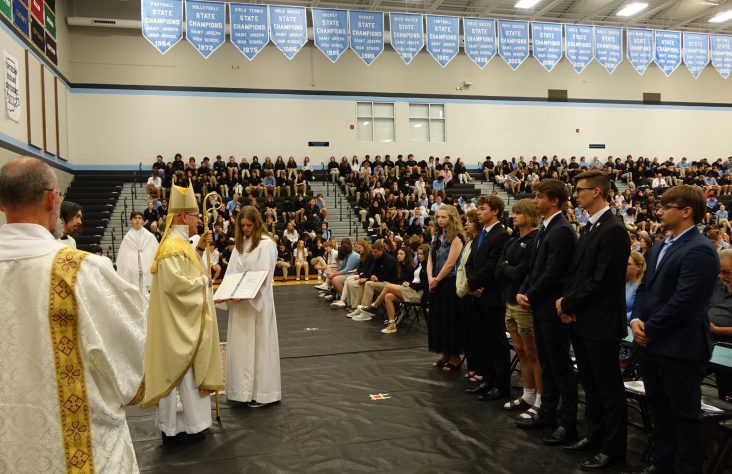March 7, 2012 // Uncategorized
St. Felix Oratory blessed, Dominican Sisters of Mary welcomed
Visit the photo gallery for more photos.

From left, Mother Assumpta Long, superior of the Dominican Sisters of Mary, Mother of the Eucharist, Bishop Kevin C. Rhoades and John Tippmann of the Mary Cross-Tippman Foundation, sign the lease for the sisters to locate to St. Felix in Huntington. The facility will be used for the formation of the Dominican Sisters of Mary.
By Tim Johnson
HUNTINGTON — “In this oratory, may God, the Father, Son and Holy Spirit, be worshipped in spirit and in truth,” exclaimed Bishop Kevin C. Rhoades in his homily at the blessing of St. Felix Oratory in Huntington.
The historic day not only included the blessing of the oratory, the dedication of the altar, but also the formal announcement that the Dominican Sisters of Mary, Mother of the Eucharist, a community of sisters based in Ann Arbor, Mich., will use a part of the former friary for formation of their sisters beginning next fall.
Bishop Rhoades thanked John Tippmann and the Mary Cross- Tippmann Foundation for the purchase and overseeing the renovation of the friary.
“I believe it is 33 years since the sacred liturgy was offered here, when St. Felix Friary closed after 50 years as a novitiate for the Capuchin Franciscan order,” he said.
The friary is revered as the hallowed home of Venerable Father Solanus Casey.
“After his ordination in 1904, Father Solanus served for 20 years in Capuchin friaries in New York, Harlem, and Yonkers,” Bishop Rhoades said in his homily. “Then, in 1924, he was assigned to St. Bonaventure Monastery in Detroit where he served for 20 years. He served as the porter, the doorkeeper, where he welcomed thousands of people.”
“People came to him because in him they experienced in a deep way the presence of God. He was renowned for his compassion,” Bishop Rhoades said. “There are many reported miracles, conversions, and other blessings received through his prayers and counsel.”
Father Solanus’ superiors sent him to St. Felix Friary in 1946, where he lived for 10 years, to ease the burden of so many visitors the simplex priest would see. Eventually, however, people flocked to Huntington as well, sometimes busloads of people from Detroit. Father Solanus worked in the friary garden and tended the beehives.
Father Solanus’ room was preserved in the friary, even when the property was owned by the United Brethren Church for many years.
“Father Solanus Casey spent much time in the chapel absorbed in prayer for long hours, even in the middle of the night,” Bishop Rhoades said of the oratory he was about to bless. “(Father Solanus) had an intense prayer life that also sustained him in illness and suffering.”
Father Solanus left St. Felix in 1956, recalled to Detroit by his superiors so that his skin disease, which was worsening could be treated at a hospital there. He died a year and a half later.
“How grateful I am that this friary where a possible future saint of the Church lived for 10 years is now once again a Catholic facility,” Bishop Rhoades said.
After the Mass, Bishop Rhoades blessed the halls and rooms of the friary and then gathered with the media, Dominican Mother Assumpta Long, superior of the Dominican Sisters of Mary, and John Tippmann, who purchased the property, for a ceremonial signing of the lease that will bring the Dominican Sisters of Mary to the facility where novitiate training will be held.
“What a day of joy it is; this is a historic place in Huntington,” Bishop Rhoades opened at the press conference. “It’s a historic place for the Church in our diocese.”
“Eighty-three years ago, when this facility was built for the Capuchin friars as a novitiate, we can think about the hundreds and hundreds of priests and brothers who grew in their relationship with Christ here and then went forth from here to serve the Lord in the spirit of St. Francis,” Bishop Rhoades said. “We remember all of them. And it is with special joy that we come to rededicate St. Felix Oratory today, to dedicate the altar of the oratory chapel, to be here to celebrate a new stage of the history of this place, a sprititual place wehre so many will come to grow in their faith, to draw closer to Christ, to be spiritually refreshed through retreats and through spiritual days that will take place here.”
“Also with special joy we welcome Mother Mary Assumpta and the Dominican Sisters of Mary, Mother of the Eucharist, who will be coming here in a few months and where sisters will be here in formation for the consecrated life — another great blessing for our diocese,” he noted.
Bishop thanked John Tippmann and Mary Cross-Tippman Foundation and the whole Tippmann family “for their faith, and for their generosity in allowing this dream to become a reality.”
“Thanks are certainly in order, and I cannot thank you enough,” said Mother Assumpta. She told those gathered that she has become familiar with the diocese by reading Today’s Catholic, and added, “It is a great honor to be in the diocese that you lead.”
To John Tippman, Mother Assumpta said, “What a family. I know all about you because you gave us the book,” referring to the family history book.
Carl Minick, the executive director of the Mary Cross Tippmann Foundation and member of St. Vincent de Paul Parish, Fort Wayne, had contacted Mother Assumpta originally a few years ago.
But just six weeks ago, the friary set up a website promoting the retreats at the facility. Minick told Today’s Catholic he sent that website link to the Dominican Sisters of Mary . The next morning, there was a message from Mother Assumpta, “that maybe this was something they could be interested in.”
John Tippmann said the friary purchase started when Fort Wayne businessman Ed Romary called him and encouraged the Fort Wayne commercial property owner to check out the friary. Romary gave Tippmann a book and Father Solanus and asked Capuchin Father Ron Rieder, pastor of Ss. Peter and Paul Parish in Huntington and who knew Father Solanus personally, to give Tippman a tour of the friary.
Tippmann said he returned to Fort Wayne and told the real estate board at his company: “We need to buy this facility down in Huntington. I don’t know what it is, but here’s their brochure. Next thing you know, we owned it,” Tippmann related at the press conference.
“I didn’t have a clue what we were going to do with it,” Tippmann said. “Father Rieder said, ‘Hey, you got faith. That’s all it going to take. You got to have faith.’”
“They say, ‘If you build something, the people will come,’” Tippmann added, “And I think if you rebuild something, they will come again. So I think this is sort of the second beginning of this facility.”
“I knew that when I bought this place, it was destined for something good,” Tippmann said after the press conference.
Tippmann told Today’s Catholic a lot of volunteers were part of the renovation, especially from the Huntington area. “Some days we had as many as 25 volunteers in here working all over — inside the building, out on the grounds, everywhere,” he said.
Father Rieder beamed with enthusiasm at seeing the friary restored and welcomed the announcement made by the Dominican Sisters of Mary. He said, “This is one of the happiest days of my life.”
Dominican Sisters of Mary, Mother of the Eucharist, to move into St. Felix
HUNTINGTON — The signing of a lease was part of the festivities associated with the blessing at St. Felix Friary on March 3. The lessee? The Dominican Sisters of Mary, Mother of the Eucharist.
Their motherhouse in Ann Arbor, Mich, is currently at capacity “due to our amazing increase in vocations. In order to preserve the integrity of life and provide proper formation for the young women, additional housing is needed. St. Felix seems perfect for this,” said Mother Mary Assumpta Long, superior for the Dominican Sisters of Mary, and one of the four founding sisters of the community.
Mother Assumpta reported through an email interview with Today’s Catholic that the conversation began about a year ago from Carl Minick, a member of St. Vincent de Paul Parish in Fort Wayne and executive director of the Mary Cross-Tippman Foundation, who had heard about their growing community and wanted to know if some sisters would possibly be interested in living at St. Felix. When the need for interim housing became apparent, “we decided to visit the monastery and as we walked through the building, it seemed like this was where God was leading us,” Mother Assumpta said.
“In the short history of our community, we have met so many wonderful and faith-filled Catholics including, now, Mr. John Tippmann,” Mother Assumpta said. “John had gone through his own prayerful discernment and then decided to purchase and renovate this monastery for the needs of the Church.”
“The fact that the renovations were completed at the same time that we sisters identified our need is a sign of God’s providential blessings for those who respond to His voice,” she added. “We will never be able to adequately thank John Tippman and his family for the beautiful renovations to this monastery and the invitation to come and live therein.”
The sisters’ lease agreement encompasses the possibility of five years.
“Our over-riding concern for our community, at this point in time, is moving forward with the building of a priory in Texas,” said Mother Assumpta. “Once the Texas priory is built, we will be able to move the sisters there.”
In the meantime, the St. Felix facility will be used for the formation of the sisters. Mother Assumpta noted she expects about 25 sisters will be locating to St. Felix in the fall.
“The sisters who will be living at St. Felix will be in their novitiate stage of formation,” said Dominican Sister Joseph Andrew Bogdanowicz, another founder of the community. “A sister is a novice for two years. During this time, she continues her religious studies as well as her human formation. The novice studies the vows she is preparing to take in her religious profession, the Rule and Constitutions governing the community and she makes a second meditation daily together with her fellow novices.”
“The first novitiate year is primarily dedicated to study and development of the interior life, while the second year is dedicated to introducing the novice to the apostolic life of the community,” Sister Joseph Andrew said. “At the end of the two years, if the sister and the community discern that it is God’s will, she professes vows of chastity, poverty and obedience for three years.”
The sisters will be faithful in carrying out the Dominican monastic life at St. Felix. The contemplative and monastic practices include daily Mass, the Liturgy of the Hours, Eucharistic Holy Hour as a community, recitation of the rosary, dedication to daily personal prayer and “cloister appropriate to our life,” noted Sister Joseph Andrew.
“It should not come as a surprise that as Dominican Sisters of Mary, Mother of the Eucharist we have deep and ardent love for the most Holy Sacrament of the altar,” Mother Assumpta said. “Christ is at the very center of our being.”
She added, “Seeking to maintain and invigorate our love for our Divine Spouse, each Dominican Sister of Mary rejoices to begin her day with a daily hour of Eucharistic Adoration and the Holy Sacrifice of the Mass. The first Friday of every month finds us before the Divine throne for night Adoration. Our monthly ‘Retreat Sunday’ includes a full day of Eucharistic Adoration and our weeklong yearly retreat offers the same.”
“The Eucharist is present, not only in the chapel of our Motherhouse, but also in the chapels of all of our mission houses,” Mother Assumpta said. “Wherever we go we always find ourselves at home because He is there.”
“We depend greatly on the presence of our Eucharistic Spouse to help us in our prayer and our work, and we could not live without Him,” Sister Joseph Andrew added. “Our vocation to live the evangelical counsels for the glory of God, the salvation of souls, and the transformation of the world only arises from the graces received from His Divine Eucharistic Presence.”
The community of the Dominican Sisters of Mary, Mother of the Eucharist is growing rapidly.
“With certainty we can say it is growing by God’s grace and mercy — not only for our community and our schools but for the good of the entire Church,” Sister Joseph Andrew said. “We seek to live our consecrated life faithfully and with devotion. Our life of consecrated fidelity attracts young women of this generation who seek such a commitment for God and His people.”
“The Dominican charism is aligned to the New Evangelization both in our prayer and our teaching mission,” added Domincian Sister John Dominic Ramussen, another of the founding sisters. “First and foremost, we must know the Person of Jesus Christ through the contemplative dimension of our life. Both the fruits of a rich prayer life and of assiduous study overflow into our teaching and preaching about the Person of Jesus Christ. Thus faith and reason are not separated as we provide in our schools challenging academics coupled with sound catechesis.”
“Young people are drawn to our clarity in living the religious life as well as in our teaching,” Sister Joseph Andrew noted.
The best news. Delivered to your inbox.
Subscribe to our mailing list today.





